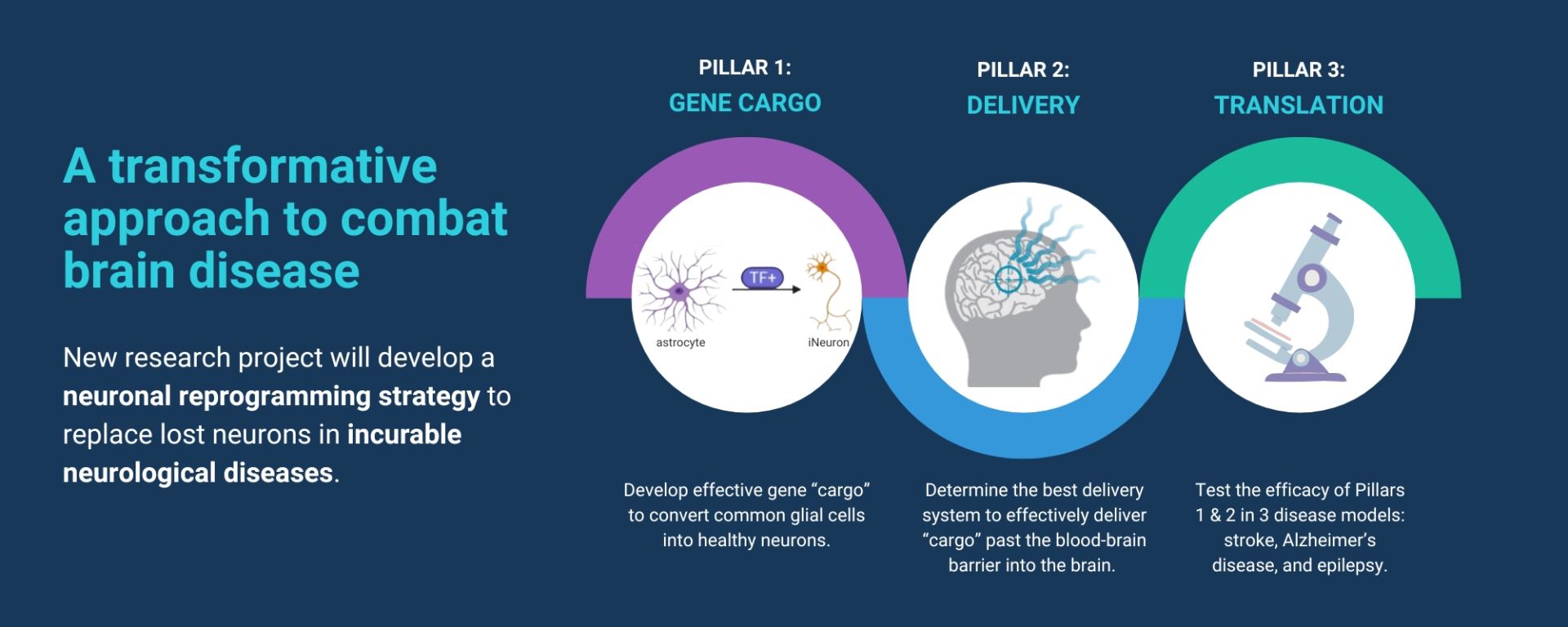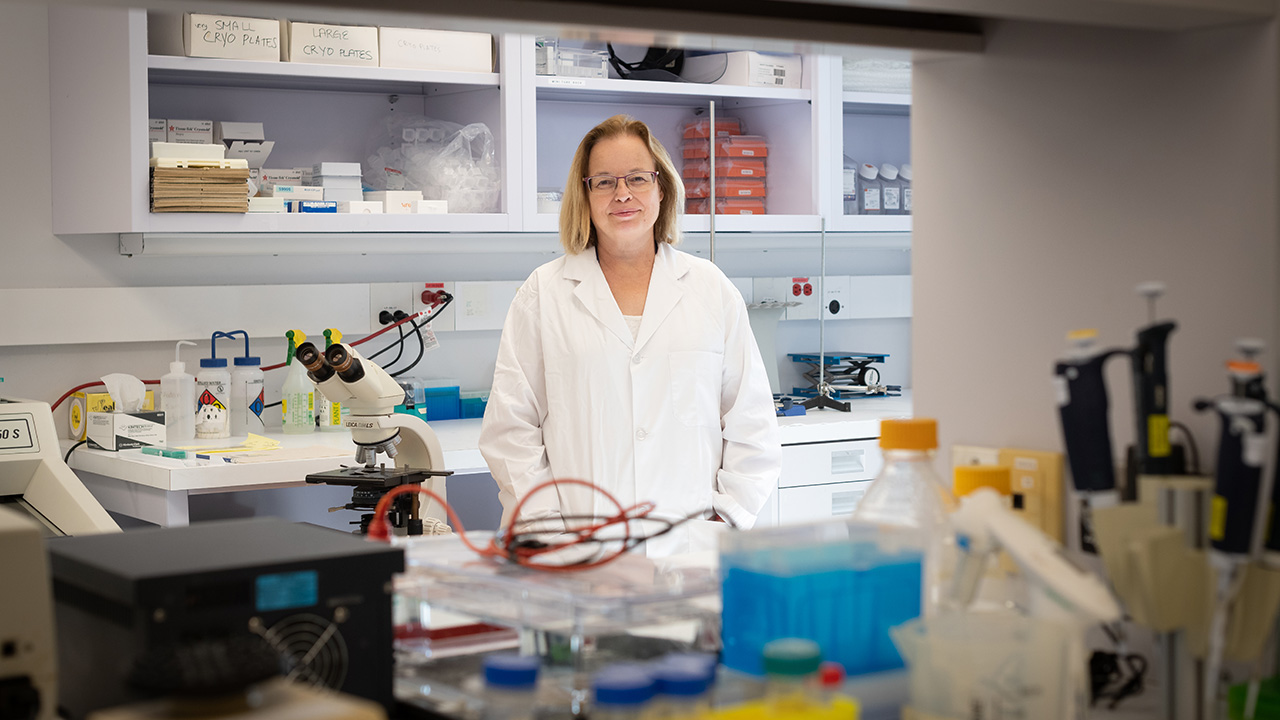Sunnybrook-led research team awarded $24M grant to develop approach to reprogram brain cells
Scientists at Sunnybrook Research Institute (SRI) have been awarded a $24 million Transformation Grant from the Government of Canada’s New Frontiers in Research Fund to develop a “game-changing” approach to combat incurable neurological disorders, like Alzheimer’s, stroke and epilepsy.
The grant involves a 24-member international team that is led by Dr. Carol Schuurmans, Senior Scientist in Biological Sciences and the Hurvitz Brain Sciences Research Program at SRI. Their award is one of only six projects across Canada selected to receive the prestigious funding, which was announced today.
A novel, interdisciplinary approach for incurable brain disease
“In neurodegenerative disorders, neurons are damaged or destroyed, which can impact important functions like movement, speech, and cognition,” says Dr. Carol Schuurmans, who holds the Dixon Family Chair in Ophthalmology Research at Sunnybrook. “One way to repair the brain in disorders like Alzheimer’s or stroke might be to make new neurons out of existing cells, called glial cells, which are supportive in function and as prevalent in the brain as neurons.”
The collaborative research team’s aims are three-fold: to develop novel gene therapies that will turn common glial cells into healthy neurons, to determine the best way to deliver gene therapeutics into the brain, and finally, to test the efficacy of the gene therapy approach in models of Alzheimer’s disease, stroke and epilepsy.

“What is particularly promising is that we are taking advantage of cells that are already there,” says Dr. Schuurmans. “We’re already seeing this approach working in preclinical models, although it’s not highly efficient. Our hope is that we can improve the technology and devise universal strategies that are not disease-specific and can be widely applicable for the treatment of different brain disorders.”
The research project comes at a pivotal time. Nearly 600,000 Canadians are currently living with Alzheimer’s disease and other dementias. With an aging population, that number is expected to rise to 1.7 million by 2050, creating an urgent need for therapeutic options.
Funding breakthrough science
Vice President of Research and Innovation at SRI, Dr. Kullervo Hynynen, who is also a co-awardee and collaborator on the project, notes that the major grant will help advance brain health in Canada and abroad. “This significant investment from the Government of Canada will enable the team to exploit the power of neuronal reprogramming as a repair strategy for some of the most difficult-to-treat brain disorders," says Dr. Hynynen.
“The award recognizes decades of tireless work from the research team and the opportunity to continue an incredibly promising line of research.”
Assembling a team of world-leading experts
The 24-member interdisciplinary research team includes scientists from across Canada, as well as Portugal, Germany, and Spain. Executive team members include Dr. Carol Schuurmans and Director and Senior Scientist of Biological Sciences at SRI, Dr. JoAnne McLaurin, a key contributor to project planning and grant writing, as well as Dr. Derrick Gibbings at the University of Ottawa. Additionally, Dr. Carrie McAiney (University of Waterloo) and Dr. Ubaka Ogbogu (University of Alberta) will spearhead an advisory team that will seek input from persons with lived experience, and study ethical and policy issues associated with the new therapeutic approach. Their goal is to facilitate buy-in for the therapy and ultimately provide equitable access to gene therapies in the future.
Dr. Carol Schuurmans will lead the work on therapeutic design along with national and international team members. Additionally, SRI’s expertise in focused ultrasound will be an important component of the research project, as the team determines how to best deliver the novel gene past the blood-brain barrier, a network of cells and tissues protecting the brain. This work will be led by Dr. Isabelle Aubert, Senior Scientist at SRI, along with SRI focused ultrasound pioneer, Dr. Kullervo Hynynen.
The third component of the project will demonstrate the efficacy of the research in disease models. Dr. JoAnne McLaurin will lead this work in a model of Alzheimer’s disease, with collaborators at the University of Toronto and the University of Calgary looking at stroke and epilepsy. SRI Senior Scientist and Director of Physical Sciences Dr. Bojana Stefanovic, and scientists Dr. Jamie Near and Dr. Hon Leong will round out the SRI team, and will develop strategies to monitor the impact of neuronal reprogramming that are translatable to the clinic.
“The award brings a certain sense of validation for the direction of our scientific work. We are thrilled to work together with such a skilled and interdisciplinary team,” says Dr. Schuurmans. “We are incredibly grateful to the Government of Canada’s Tri-council research agencies (CIHR, NSERC, SSHRC) for this significant investment in the future of brain health.”
In addition to government grants like this one, philanthropic investment is a key driver of research and scientific innovation. These vital advancements are made possible and supported by Sunnybrook’s generous community of donors .



